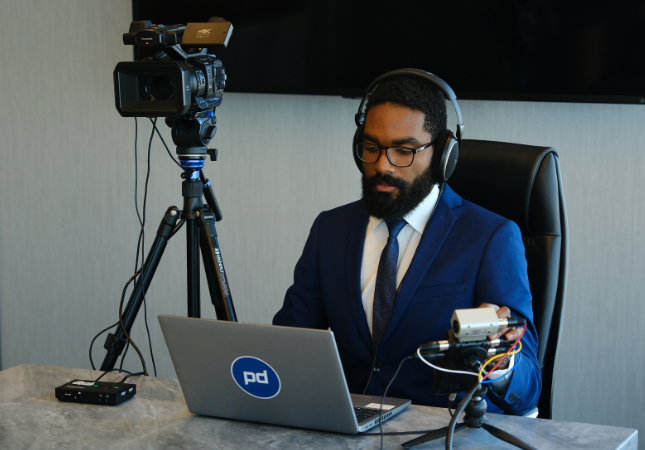The Significance of Legal Video Depositions in Modern Legal Providers: What You Must Know
Lawful video depositions have come to be important in today's lawful landscape. They provide a multidimensional view of witness testimonies that conventional records merely can not match. By recording both spoken and non-verbal communication, these depositions improve the total understanding of a witness's integrity. Nevertheless, the effectiveness of video depositions rests on different aspects, including conformity with lawful requirements and ideal practices (legal video depositions). Checking out these aspects exposes their true significance in modern lawful solutions
What Are Legal Video Clip Depositions?
Lawful video depositions work as a crucial tool in the litigation procedure. They involve videotaping witness testaments in a video clip style, catching both non-verbal and spoken communication. This technique permits attorneys to document the attitude, expressions, and reactions of witnesses, providing a richer context for the statement. Generally carried out in a controlled atmosphere, these depositions are led by attorneys who ask concerns while a stenotype reporter records the discussion. The resulting video clip can be important for trial preparation, as it enables attorneys to assess the integrity of witnesses and improve their methods. Furthermore, lawful video depositions can be made use of in different legal contexts, varying from civil disputes to criminal instances. The visual and acoustic elements of video depositions improve the discussion of evidence, making it a necessary part in the modern lawful landscape. In general, they add substantially to the efficiency and effectiveness of legal proceedings.

Advantages of Video Clip Depositions Over Traditional Approaches
Video depositions provide many advantages compared to typical methods of taking witness statements. One substantial benefit is the ability to capture both audio and visual aspects, giving a much more extensive document of the witness's declarations. This twin format boosts clearness and allows lawyers to reference specific nuances throughout trial prep work. In addition, video depositions help with remote participation, making it simpler for witnesses who may be inaccessible for in-person appearances because of geographical restrictions or health and wellness issues.Moreover, video clip depositions can speed up the total deposition process, decreasing the time and expenses related to traveling and logistics. They likewise boost availability, as taped depositions can be quickly shared amongst legal teams and referenced at any type of time. This comfort adds to much better instance management and prep work. In general, video clip depositions represent a modern-day, efficient technique to gathering witness statements, straightening with the evolving requirements of the legal career.
The Function of Body Movement and Tone in Testimonies

In legal video clip depositions, body movement and tone play essential duties in communicating a witness's integrity and trustworthiness. Nonverbal signs can give insights into a witness's emotion, affecting exactly how their statement is perceived. Understanding the effect of these aspects is vital for jurors and lawyers alike when evaluating the dependability of a testament.
Nonverbal Interaction Insights
While verbal interaction is often stressed in lawful statements, nonverbal signs such as body movement and tone play a crucial role in communicating trustworthiness and emotion. Observers of depositions might note that a witness's position, motions, and face expressions can substantially affect assumptions of integrity. Constant eye call may indicate self-confidence, while preventing gaze could suggest deceit or pain. Likewise, the tone of voice-- its speed, quantity, and pitch-- can pass on sensations of sincerity or unpredictability. Legal specialists need to be in harmony with these nonverbal signals, as they typically give crucial context that complements spoken words. Comprehending these subtleties can boost the performance of depositions and affect the outcome of lawful process.
Psychological Tone Effect
The psychological tone conveyed throughout legal testaments substantially impacts just how a witness is perceived. Body movement, vocal inflections, and facial expressions play crucial roles in forming the story of a statement. A witness showing self-confidence with steady eye get in touch with and a calm tone can infuse a feeling of dependability and interaction. Conversely, signs of stress and anxiety, such as fidgeting or an unstable voice, may result in apprehension regarding their account. The nuances of emotional expression can influence the analysis of truths, making it vital for lawyers to identify these signs. In video clip depositions, the aesthetic and acoustic components combine, stressing the relevance of emotional tone in conveying sincerity and reliability within the legal procedure.
Integrity and Reliability
An important aspect in developing reliability and credibility throughout testaments exists in the witness's body movement and intonation. Observers often depend on non-verbal signs-- such as eye contact, position, and motions-- to evaluate a witness's sincerity. For example, a witness that preserves eye contact and presents open body language may be perceived as even more truthful and trustworthy than one that prevents eye call or shows up blocked. Additionally, intonation plays an essential function; a consistent, tranquil tone can reinforce the integrity of the testimony, while variations in pitch or volume might raise uncertainties. Eventually, the combination of body language and vocal tone significantly influences just how a witness's declarations are received and analyzed in a lawful context.
Ideal Practices for Performing Video Clip Depositions
Performing video depositions needs careful planning and execution to ensure a efficient and clear presentation of testament. First, it is very important to select a silent, well-lit location to lessen diversions and protected ideal video clip high quality. The tools needs to be examined in advancement, consisting of cameras, microphones, and illumination, to avoid technical problems during the deposition.Next, celebrations included need to assess the format and procedures in advance, making sure that everybody understands their functions. The deponent needs to be briefed on the procedure, including exactly how to react clearly and concisely.Additionally, preserving an expert attitude throughout the session is necessary. This consists of refraining from speaking over one an additional and verifying that all inquiries are guided appropriately. It is crucial to videotape the deposition in a style that enables for very easy playback and evaluation, maintaining the stability of the testimony for future use.
Lawful Factors To Consider and Conformity Issues
Exactly how do lawful considerations and conformity problems use this link influence the performance of video clip depositions? Lawyers need to navigate a complicated landscape of laws, ensuring that video depositions stick to jurisdictional regulations and criteria. Compliance with regulations worrying personal privacy, approval, and taping techniques is essential. For instance, obtaining explicit approval from all parties involved is required to stay clear of legal repercussions.Additionally, the admissibility of video clip proof in court can depend upon compliance with step-by-step requirements. Ensuring that the tools used fulfills technological standards is likewise essential, as low quality can undermine the deposition's reliability.Moreover, lawyers must know any type of particular state laws that control video depositions, as these can vary considerably. Failure to deal with these factors to consider can not only jeopardize the stability of the deposition however also impact the total case approach, ultimately affecting the customer's legal results.
How Video Clip Depositions Influence Court Perception
While video clip depositions can function as effective devices in legal proceedings, their influence on jury understanding is substantial. The visual and acoustic elements of video clip recordings offer jurors with a much more complete understanding of witness attitude, integrity, and emotional responses. This multimedia method can boost the jurors' capacity to examine the reliability of statement contrasted to standard text-based transcripts.Moreover, video depositions allow jurors to observe body language, tone of voice, and faces, every one of which can affect their interpretation of the witness's declarations. The existence of a witness on display can humanize them, promoting compassion and connection, which may guide jurors' opinions. On the other hand, a witness who appears undependable or incredibly elusive on video may cause negative assumptions that influence a jury's decision. Inevitably, the dynamic nature of video clip depositions plays a crucial duty fit just how jurors interpret proof and reach their home verdicts.
The Future of Video Depositions in Legal Practice
As developments in technology remain to improve the lawful landscape, the future of video clip depositions is poised for substantial development. Developments such as synthetic knowledge, virtual fact, and boosted video clip conferencing devices are anticipated to improve the deposition process and boost availability. Legal experts might utilize AI-driven analytics to evaluate witness reliability and instance toughness much more effectively.Moreover, the integration of digital truth might allow juries to experience immersive simulations of depositions, providing deeper context and understanding. Additionally, the pattern towards remote depositions is likely to continue, providing better flexibility for customers and lawyers alike.As remote job ends up being increasingly stabilized, video depositions will likely become common method, reducing prices and time constraints connected with traditional methods. In general, these technical improvements promise to boost the efficiency, efficiency, and ease of access of video clip depositions in legal method, inevitably changing just how lawyers prepare for test.
Frequently Asked Concerns
Just How Much Do Lawful Video Clip Depositions Generally Cost?

Can Video Depositions Be Made Use Of in Any Kind Of Sort Of Instance?
Video clip depositions can be utilized in different kinds of situations, consisting of civil, criminal, and family members legislation. Their versatility enables attorneys to present witness statements efficiently, adjusting to the specific requirements of various lawful scenarios.
What Devices Is Required for a Video Clip Deposition?
To conduct a video clip deposition, necessary equipment consists of a high-grade video camera, microphone, illumination, and a dependable recording tool. Furthermore, a computer with modifying software application may be essential for post-production and formatting the final video clip.
How Long Does a Regular Video Deposition Last?
A typical video deposition lasts between two to four hours, relying on the intricacy of the situation and the variety of questions postured. Extended sessions might take place, but breaks are typically integrated for individual comfort.

Are Video Clip Depositions Admissible in Court?
Video depositions are normally permissible in court, provided they stick to legal standards and policies of proof. Their use enhances clearness and preserves witness testament, aiding in the judicial procedure throughout tests and hearings. Lawful video depositions have actually become essential in today's lawful landscape. Additionally, lawful video depositions can be utilized in numerous lawful contexts, ranging from civil disputes to criminal cases. In addition, video clip depositions help with remote engagement, making it much easier for witnesses who may be not available for in-person looks due to geographical restrictions or health and wellness issues.Moreover, video depositions can quicken the total deposition process, decreasing the time and expenses associated with travel and logistics. Ensuring that the devices used fulfills technical standards is also crucial, as poor quality can undermine the deposition's reliability.Moreover, attorneys have to be aware of any kind of specific state laws that govern video depositions, as these can differ considerably. Furthermore, the fad towards remote depositions is likely to linger, using higher versatility for lawyers and clients alike.As remote job becomes significantly stabilized, video depositions will likely end up being conventional technique, lowering expenses and time restraints associated with standard approaches.